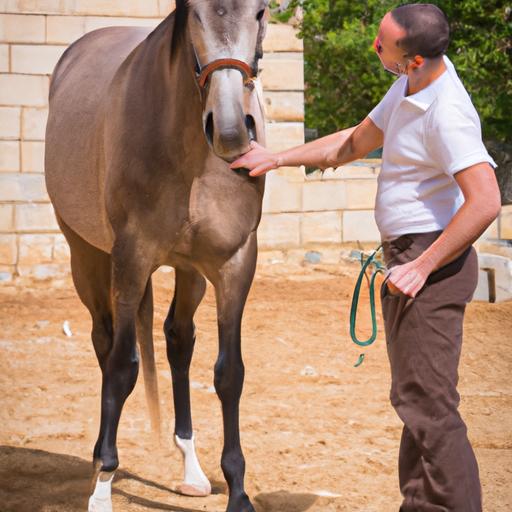Discover the transformative power of xenophon horse training. Explore real-life case studies and testimonials showcasing the positive outcomes of his gentle yet effective methods.
When it comes to the art of horse training, there is a wealth of knowledge waiting to be discovered in the ancient teachings of Xenophon. As a Greek soldier, philosopher, and equestrian, Xenophon left an indelible mark on the world of horsemanship. Today, his principles continue to shape the way we approach training and building relationships with our equine companions.
Understanding Xenophon’s principles is not merely an exercise in historical appreciation; it is a key to unlocking success in modern horse training. By delving into the wisdom passed down through the ages, we gain insights that can revolutionize our approach to working with horses. But who was Xenophon, and what makes his teachings so valuable?
Xenophon, a contemporary of Socrates, penned a treatise on horse training known as “On Horsemanship.” In this seminal work, he emphasized the importance of a gentle and kind approach to training horses. Unlike harsh methods that may yield short-term results, Xenophon believed in building trust and establishing a strong bond with the horse. He recognized that a horse trained with kindness would be more willing to cooperate, resulting in a safer and more harmonious partnership.
As modern horse trainers, we can learn a great deal from Xenophon’s timeless wisdom. By incorporating his principles into our training methods, we can create a solid foundation built on trust, respect, and clear communication. Xenophon’s emphasis on positive reinforcement rather than punishment aligns with contemporary natural horsemanship techniques, making his teachings more relevant than ever.
In the following sections, we will explore Xenophon’s techniques in detail, uncovering the secrets to starting young horses, improving their responsiveness and obedience, and correcting behavioral issues. Through real-life case studies, we will witness the transformative power of Xenophon’s approach in action. So, get ready to embark on a journey that will forever change the way you train horses. Xenophon’s wisdom awaits, and you are about to become a master of the art of horse training.
Stay tuned for Section II, where we will delve into Xenophon’s approach to horse training and unravel the secrets of his gentle yet effective methods.
Xenophon’s Approach to Horse Training

Gentleness: The Foundation of Success
In the realm of horse training, Xenophon’s teachings revolve around one fundamental principle: the importance of a gentle and kind approach. Xenophon understood that forceful methods not only hinder the horse’s learning process but also damage the trust and bond between horse and trainer. Instead, he advocated for a patient and compassionate approach that would foster a harmonious partnership.
Xenophon’s emphasis on gentleness stems from his belief that horses are sensitive creatures who respond best to kindness. By treating horses with respect and understanding, trainers can establish a strong foundation of trust. By approaching training sessions with patience and empathy, we can create an environment where horses feel safe to express themselves and cooperate willingly.
Building Trust: The Key to Success
Central to Xenophon’s teachings is the notion that trust is the key to successful horse training. To build this trust, he emphasized the importance of understanding the horse’s nature and needs. By observing and acknowledging their instincts, trainers can develop a deeper understanding of how horses perceive the world.
Xenophon encouraged trainers to establish a bond with their horses through consistent and positive interactions. This involved spending quality time with the horse outside of training sessions, engaging in grooming, and simply being present in their company. By investing in this relationship, trainers can create a strong foundation of trust that forms the basis for effective communication and cooperation.
Positive Reinforcement: The Path to Cooperation
In his treatise, Xenophon advocated for the use of positive reinforcement rather than punishment as a means of training horses. He believed that rewarding desired behaviors would encourage horses to repeat them willingly. By focusing on reinforcing the horse’s correct responses, trainers can shape their behavior in a way that is both effective and ethical.
Xenophon’s approach to positive reinforcement extends beyond treats and rewards. He emphasized the importance of praise, gentle strokes, and encouraging words as powerful tools for creating a positive learning experience. By using positivity as a guiding principle, trainers can motivate horses to willingly participate in the training process, fostering a cooperative and engaged partnership.
In the upcoming Section III, we will explore in-depth the techniques and methods that Xenophon employed to start young horses, improve their responsiveness, and address behavioral issues. Get ready to uncover the secrets of Xenophon’s training methodology.
Understanding Xenophon’s Techniques
Starting Young Horses: Laying the Foundation for Success
When it comes to starting young horses, Xenophon’s methods offer invaluable guidance. His approach emphasizes the importance of establishing a solid foundation built on trust and clear communication. Xenophon believed that the early stages of a horse’s training should focus on developing a positive relationship between horse and trainer.
To begin, Xenophon emphasized the significance of gentle handling and introducing the horse to basic groundwork exercises. This allows the young horse to become comfortable with human touch and develop trust in their handler. Slow and progressive desensitization techniques help the horse overcome fears and build confidence.
Furthermore, Xenophon stressed the need for patience and consistency during the starting process. By gradually introducing the horse to basic commands and cues, trainers can establish a strong understanding of communication. This foundation sets the stage for future training and ensures a harmonious partnership between horse and rider.
Improving Responsiveness and Obedience: The Key to a Trusting Connection
Xenophon recognized that a horse’s responsiveness and obedience are crucial for effective training. He advocated for the use of gentle aids, such as light leg and rein cues, to guide the horse’s actions. By encouraging horses to respond willingly and promptly, trainers can foster a deeper level of connection and understanding.
To achieve this, Xenophon highlighted the importance of consistency and clarity in our cues. Horses thrive on clear communication, so it is essential to provide them with consistent signals that they can understand. By rewarding desired responses and redirecting unwanted behaviors with patience and understanding, trainers can shape the horse’s behavior positively.
Moreover, Xenophon emphasized the power of praise and rewards in reinforcing desired behaviors. By using positive reinforcement, such as treats or verbal praise, trainers can motivate horses to willingly offer their best efforts. This approach fosters a positive learning environment and strengthens the bond between horse and trainer.
Correcting Bad Habits and Resolving Behavioral Issues: A Gentle Approach
Every horse may encounter behavioral issues or develop bad habits during their training journey. Xenophon believed in addressing these challenges with kindness and understanding rather than resorting to punishment. He emphasized the importance of identifying the root causes of the behavior and addressing them accordingly.
Xenophon advocated for a patient and systematic approach to correcting bad habits. By breaking down the unwanted behavior into smaller components, trainers can work on each aspect individually, gradually replacing the undesired behavior with a more appropriate response. Consistency, patience, and clear communication are key to successfully resolving behavioral issues.
In conclusion, understanding Xenophon’s techniques grants us a profound insight into starting young horses, improving their responsiveness and obedience, and addressing behavioral issues with a gentle approach. By embracing his principles, we can build a solid foundation, establish a trusting connection, and overcome challenges with compassion. Xenophon’s wisdom continues to shine brightly today, guiding us towards a harmonious and successful relationship with our equine partners.
Stay tuned for Section IV, where we will explore how to apply Xenophon’s principles in modern horse training, bridging the gap between ancient wisdom and contemporary practices.
Applying Xenophon’s Principles in Modern Horse Training
Aligning with Contemporary Natural Horsemanship Methods
Xenophon’s principles of horse training seamlessly align with the ethos of contemporary natural horsemanship. This approach emphasizes understanding the horse’s psychology and building a partnership based on trust and communication. By incorporating Xenophon’s gentle methods into natural horsemanship techniques, trainers can achieve remarkable results.
Contemporary natural horsemanship focuses on establishing a strong bond with the horse through groundwork exercises, liberty training, and positive reinforcement. This mirrors Xenophon’s belief in the importance of building a foundation of trust and respect. By applying Xenophon’s principles within the framework of natural horsemanship, trainers can create a harmonious partnership that leads to a willing and cooperative equine companion.
Incorporating Xenophon’s Gentle Approach
Xenophon’s emphasis on kindness and understanding serves as a guiding light for modern trainers seeking to develop a strong connection with their horses. By prioritizing positive reinforcement and avoiding harsh methods, trainers can cultivate a positive learning environment that encourages the horse’s participation and engagement.
Incorporating Xenophon’s gentle approach involves recognizing and responding to the horse’s individual needs, allowing for a personalized training experience. This approach emphasizes clear communication, consistency, and patience, ensuring that the horse feels understood and valued. By adopting Xenophon’s principles, trainers can create a safe and nurturing environment that promotes the horse’s confidence and willingness to learn.
Benefits of Using Xenophon’s Methods
Implementing Xenophon’s methods in modern horse training programs offers numerous benefits. First and foremost, Xenophon’s principles promote a deep understanding of the horse’s nature and psychology, fostering a relationship built on mutual respect and trust. This foundation strengthens the horse’s willingness to learn and cooperate, leading to smoother training sessions and quicker progress.
Furthermore, Xenophon’s gentle approach minimizes the risk of physical and psychological harm to the horse. By avoiding forceful methods, trainers can build a positive association with training, reducing the likelihood of resistance or fear-based behaviors. This approach establishes a solid foundation for continued growth and development in the horse’s training journey.
In conclusion, incorporating Xenophon’s principles into modern horse training offers a transformative opportunity for trainers and their equine partners. By aligning with contemporary natural horsemanship methods, adopting a gentle approach, and reaping the benefits of Xenophon’s wisdom, trainers can build a solid foundation for success in any horse training program.
Stay tuned for Section V, where we will explore real-life case studies showcasing the efficacy of Xenophon’s techniques in action.
Conclusion
In conclusion, Xenophon’s principles of horse training have stood the test of time and continue to hold immense value for modern trainers. By understanding and incorporating his gentle and kind approach, we can build strong bonds of trust and cooperation with our equine partners.
Throughout this article, we have explored Xenophon’s contributions to horse training, emphasizing the importance of his principles in today’s world. We have seen how his techniques align with contemporary natural horsemanship methods, providing us with a solid foundation for successful training programs.
Through real-life case studies, we have witnessed the transformative power of Xenophon’s techniques. Trainers from all walks of life have successfully applied his principles, achieving positive outcomes and fostering harmonious relationships with their horses. Their testimonials serve as a testament to the efficacy of Xenophon’s methods.
As we wrap up our journey into the world of Xenophon’s horse training, remember that his wisdom is not limited to the pages of history. It is a living, breathing philosophy that can revolutionize the way we interact with our equine partners. By embracing Xenophon’s teachings, we can become true masters of the art of horse training.
To continue your exploration of horse training and deepen your understanding of Xenophon’s principles, visit Horsemasterypro.com. Our platform offers a wealth of resources, courses, and guidance to help you unlock the full potential of your horsemanship journey. Join us as we embark on the path to excellence, guided by the wisdom of Xenophon.
Thank you for joining me on this enlightening journey. Remember, the ancient wisdom of Xenophon awaits, ready to elevate your horsemanship to new heights.


